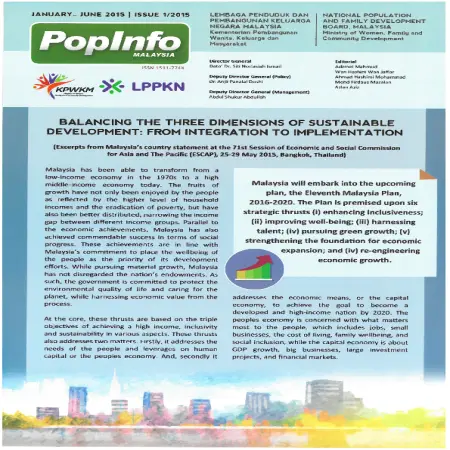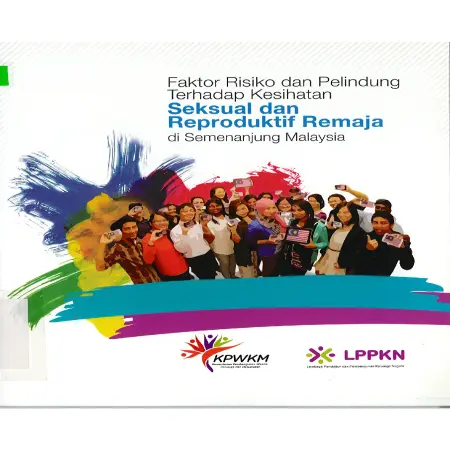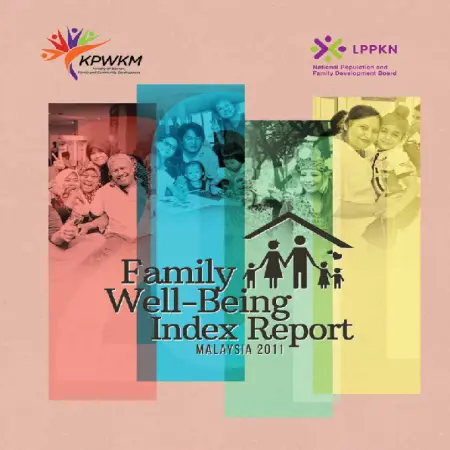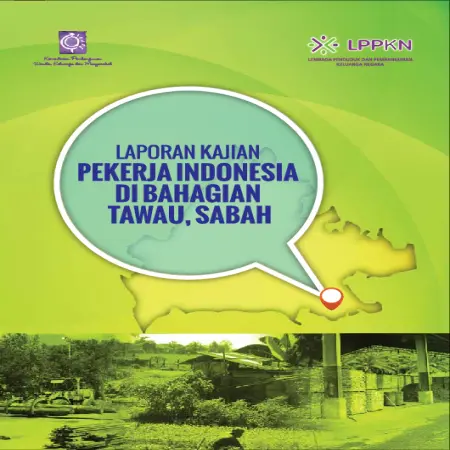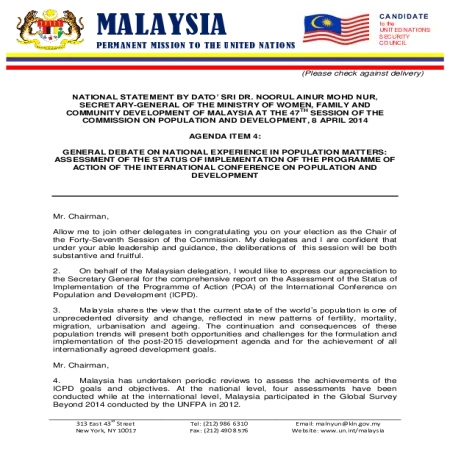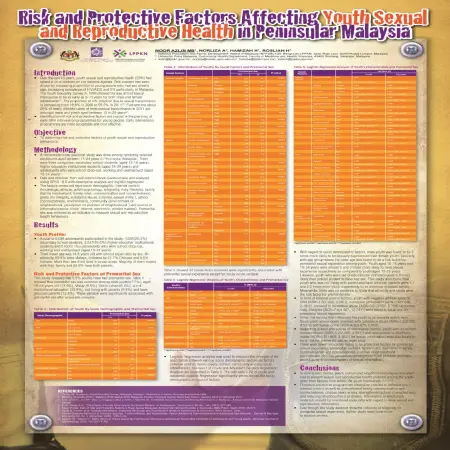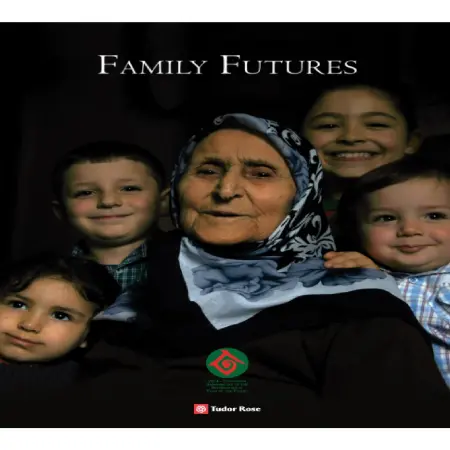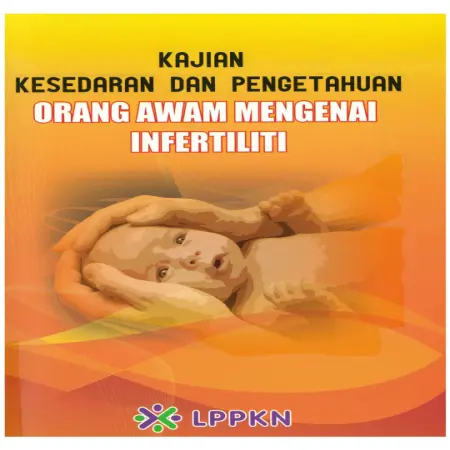TOPICS
|
|
Balancing the three dimensions of sustainable development: from integration to implementation
Item Type: Newsletter
Editor:
Year: 00/00/2015
Abstract: Malaysia has been able to transform from a low-income economy in the 1970s to a high middle-income economy today. Parallel to the economic achievement, Malaysia has also achieved commendable success in terms of social progress. These achievements are in line with Malaysia’s commitment to place the wellbeing of the people as the priority of its development efforts. As such, the government is committed to protect the environmental quality of life and caring for the planet, while harnessing economic value from the process.
|
|
|
|
|
|
Faktor risiko dan pelindung terhadap kesihatan seksual dan reproduktif remaja di Semenanjung Malaysia
Item Type: Research Report
Editor:
Year: 00/00/2015
Abstract: In Malaysia, statistics from the National Registration Department (NRD) show that a total of 214,033 illegitimate children were born from 2004 to 2009. While statistics from the Royal Malaysia Police (RMP) show that 596 cases of baby abandonment were reported from 2005 to 2013. For the total number of rape crimes in among teenagers under the age of 18, PDRM statistics show an increase from 1,710 cases in 2006 to 2,658 cases in 2013. The increase in such cases shows that today's teenagers face the problem of moral decay and fragility of identity which is a concern of Malaysian society. Accordingly, knowledge of sexual and reproductive health can help adolescents avoid negative symptoms such as cases of extramarital pregnancies and social symptoms related to sexuality. The objective of this study was to (i). to study the prevalence of unhealthy sexual behavior among adolescents aged 13-24 years in peninsular Malaysia; (ii). identify risk factors related to adolescent sexual and reproductive health (ASRH); and (iii). identify protective factors related to ASRH. This study was implemented using two (2) main approaches, namely quantitative and qualitative methods. The design of the quantitative study was successfully conducted on 5,088 adolescents aged 13 to 24 years. The qualitative study involved a total of eight (8) Focus Group Discussions (FGD) conducted in eight (8) selected detention centers and shelter hostels located in several states in Peninsular Malaysia.
|
|
|
|
|
|
Family Well-Being Index Report Malaysia 2011
Item Type: Research Report
Editor:
Year: 00/00/2015
Abstract: In the past few decades, Malaysia has and is still undergoing a process of rapid social and economic development. This is a result of policies implemented by the government such as the New Development Policy (1991-2000), National Vision Policy (2001-2010) and Government Transformation Programme (2010-2020) which all aim to transform Malaysia into a developed and competitive country. However, the processes has imposed increased demands on the family institution because of the responsibilities and the challenges faced by the family
itself. The family institution must be strengthened to offset the rapid process of social and economic development. This is important because family is the basic social unit which prepares and supplies human capital resources for national development. Given the importance of family well-being to the future of the country, a scientific study needs to be conducted to measure the level of well-being of families in Malaysia. Measuring family well-being is crucial as it can indirectly measure the impact of the implementation of national social and economic development policies on families and the extent to which the implemented policies and programmes are successful or otherwise. Hence, this study has identified suitable indicators that can provide
information about the well-being of families in Malaysia. Subsequently,
based on the identified indicators, a Family Well-Being Index (FWI) was
developed to measure the current well-being of the family as well as
to be used in policy formulation, planning for implementation of future
research, the development of new programmes and services, and
expansion of the existing programmes.
|
|
|
|
|
|
Laporan Kajian Pekerja Indonesia di Bahagian Tawau, Sabah
Item Type: Research Report
Editor:
Year: 00/12/2014
Abstract: In 2009, the National Population and Family Development (NPFDB) has implemented a Strategic Plan Review Second Population (KPSK-2) which takes consider relevant new policies and scenarios demographics and families as well as changes that occurred over a period of a decade and a half let go. One of the components found in this study is concerned with international migration. Results from KPSK-2 and several surveys specifically that has been done in Sabah, found the presence of foreign workers in that amount large in Sabah has resulted in stress to basic social services in particular from the aspect of health and education. In addition that, it also puts pressure as well security and political concerns. Accordingly, in 2010, Ministry of Women, Family and Development The community through NPFDB has run Study of Indonesian Workers in Tawau Division, Sabah to collect information simultaneously from various categories of respondents consisting of Indonesian workers, residents local and employers who use Indonesian employee services. The main objective of the study this is to collect sociodemographic information of Indonesian workers, entry factors, involvement by sector and type of occupation, the impact of admission on the local population and proposed approaches or measures that suitable for employee management and control Indonesia in this country. The fieldwork of the study has taken time for two weeks i.e. from 24 November to 6 December 2010. The location of this study is in the Tawau Division which covers the district Tawau, Kunak and Semporna. For the election sample of Indonesian workers and employers, framework sampling used in the study this is a list of employers who employ Indonesian workers derived from Department of Manpower of Tawau, Kunak and Semporna. Next, the sampling method on a quota basis and comfortably used to select both categories of respondents. Share selection of local population samples, methods comfortable sampling was used given the absence of a sampling frame locals who have employees Indonesia in their community. As a result, information from 896 Indonesian workers, 787 locals and 37 people employers have been successfully collected. Results of interviews conducted against Indonesian workers, found two main factors their migration to Sabah was for looking for more jobs and income height. In addition, migration factors not an economy like strategic geography, the presence of family or relatives and religious and cultural similarities as well affecting their migration here. Results of interviews with locals in turn found most of them to be of the opinion
that the migration of Indonesian workers here is due to the position factor of Tawau which is located adjacent to Indonesia and following in the footsteps of relatives or friends who have or have worked here. Besides, it is also influenced by the unemployment rate high in their country of origin and opportunity more wide open work here.
|
|
|
|
|
|
Population and Family Policies in Malaysia
Item Type: Conference or Workshop Item
Editor:
Year: 26/06/2014
Abstract: One of the objectives of development in the country is to improve the quality of life for all the people. Therefore, populations are at the core of development. Understanding demographic trends provides policy-makers with the tools to design interventions that lead to development especially in social sectors (family, health, education and labour) and providing infrastructure services. Knowledge on the population is crucial for planning resource allocation and designing appropriate policies. This paper intends to provide a review of population trends and population-related policies in Malaysia.It considers descriptions of Malaysia demographic changes, and then turns to the 1966 family planning programmes, the 70 million Population Policy in 1984 and to the recent Family Policy. This paper also attempts to provide insight into these policies by their evolutions, patterns and approaches, characteristics and provide recommendations for the future challenges.
|
|
|
|
|
|
The 47th session of the Commission on Population and Development on agenda item 4: general debate on national experience in population matters: assessment of the status of implementation of the programme of action of the international conference on population and development, New York, 8 April 2014
Item Type: Country Statement
Editor:
Year: 08/04/2014
Abstract: Malaysia shares the view that the current state of the world’s population is one of unprecedented diversity and change, reflected in new patterns of fertility, mortality, migration, urbanisation and ageing. The continuation and consequences of these population trends will present both opportunities and challenges for the formulation and implementation of the post-2015 development agenda and for the achievement of all internationally agreed development goals.
|
|
|
|
|
|
Seminar Antarabangsa Kekeluargaan di Persada Johor pada 13 Februari 2014.
Item Type: Video
Editor:
Year: 13/02/2014
Abstract: Johor College of Islamic Studies (MARSAH) in collaboration with the National Population and Family Development Board (NPFDB), Ministry of Women, Family and Community Development and Johor Bahru City Council (JBCC) took the initiative to organize the International Conference on Family from a Global Perspective to contribute towards development efforts ummah in an integrated manner based on a tajdid approach that takes into account the ideas of ijtihad that are deemed appropriate to be implemented in today’s society. The objective of this conference is to expose issues related to family institutions from a global perspective, explore views related to family issues especially children's rights from an Islamic perspective, explain the position and stance of Islam on family issues that touch on matters related to religion, social, culture, education and so on. In addition, look at the legal provisions related to children in Malaysia and the Southeast Asian region and others. The era of globalization is a century that greatly challenges the integrity of identity and survival of Muslims today, including family institutions. In facing the challenge, Muslims need to plan a futuristic agenda based on the development that will take place in the future. This is in line with the theme of the conference, "Challenges and Future of Islamic Family Institutions". This one-day conference consists of three slots: i) Adopted Children and Illegal Children in Islam ii) Hukum Hakam Related to Marriage in Islamic Family Law iii) Challenges in Islamic Family Issues The main speech in the conference was Honoured Tun Dr. Mahathir bin Mohamad, former Prime Minister of Malaysia. Conference paper presenters include senior lecturers from Institutions of Higher Learning in and outside the country including from Thailand, Brunei Darussalam and Indonesia. The one-day conference was attended by 300 participants consisting of officials from government agencies, non-governmental organizations (NGOs), research institutions, academics, professional organizations and Higher Institutions students.
|
|
|
|
|
|
Risk and protective factors affecting youth sexual and reproductive health in Peninsular Malaysia
Item Type: Scientific Poster
Editor:
Year: 00/01/2014
Abstract: Over the last 10 years, youth sexual and reproductive health (SRH) had raised a lot of concern on the national agenda. This concern has been driven by increasing proportion of young people who had sex at early age, increasing prevalence of HIV/AIDS and STI particularly in Malaysia.
|
|
|
|
|
|
Malaysia's initiatives for sustainable family development
Item Type: Book Section
Editor:
Year: 01/01/2014
Abstract: Various initiatives to strengthen the family institution have been undertaken by the Government of Malaysia through the Ministry of Women, Family and Community
Development (MWFCD). Through its agency, the National Population and Family Development Board (NPFDB), the MWFCD has formulated, developed and implemented policies and programmes such as the National Family Policy,
1Malaysia Family First (1MF1st) and 1Malaysia Youth Empowerment and Support (1MYes) programmes, One-Stop Family Centres, and family education programmes such as the Strengthening of Marriage Institution (SmartStart remarriage programme), Parenting@Work, Smart Belanja@Lppkn (family financial management programme), KASIH Parenting Modules and counselling services.
To ensure sustainable family development, the National Family Policy (NFP) and its accompanying plan of action was launched in March 2011 and implemented by the NPFDB in partnership with other ministries, departments and related non-government organizations (NGOs). The aim of this explicit policy is to develop prosperous, healthy and resilient families to ensure social stability. The NFP is
a key policy that focuses on aspects of family well-being and development, providing direction for the development of family-friendly programmes and services for nurturing healthy and resilient families in line with the aspirations
of Vision 2020.
|
|
|
|
|
|
Kajian kesedaran dan pengetahuan orang awam mengenai infertiliti
Item Type: Research Report
Editor:
Year: 00/01/2014
Abstract: The study conducted by the Human Reproductive Division, National Population and Family Development Board aims to identify the extent of the public awareness and knowledge about infertility. The sampling method of the study is convenience sampling; involving the display of questionnaires on other websites are also provided. The completed questionnaires were collected, recorded and analyzed using SPSS software. The statistical analysis carried out is descriptive statistics and the Chi-square Test.
|
|
|
|





